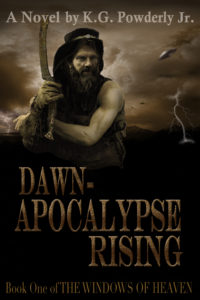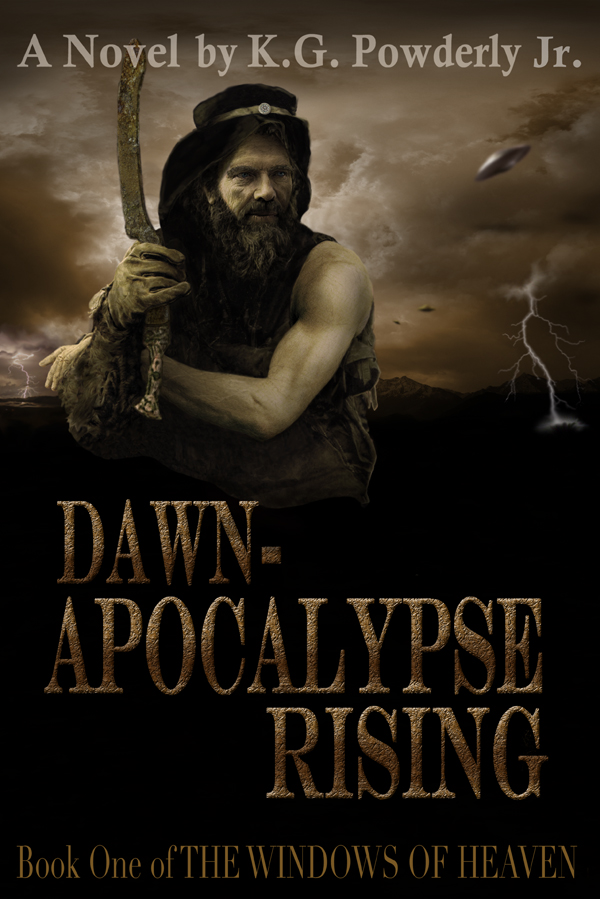A Well-Researched Imaginative Retelling Of The Biblical Noah
 The Windows of Heaven is a five-novel epic retelling of the Biblical account of Noah and the Flood. The epic’s premise is that much of the Sumero-Akkadian mythology and language is revisionist history by a polytheistic people. Author K. G. Powderly Jr. seeks to creatively rediscover the pre-Flood world by unraveling the corruptions committed by later post-Flood peoples.
The Windows of Heaven is a five-novel epic retelling of the Biblical account of Noah and the Flood. The epic’s premise is that much of the Sumero-Akkadian mythology and language is revisionist history by a polytheistic people. Author K. G. Powderly Jr. seeks to creatively rediscover the pre-Flood world by unraveling the corruptions committed by later post-Flood peoples.
Powderly has certainly done his research! Drawing together the Biblical account with findings from archaeology [particularly out of place artifacts, or OOPArts: technology that should not exist among primitive peoples as far as the evolutionary version of history is concerned], apocryphal works [like the Ethiopic Enoch (1 Enoch), Slavonic enoch (2 Enoch), the “Lamech Fragment” of the Genesis Apocryphon, historical works [such as Beowulf and Josephus’ Antiquities], and Sumero-Akkadian myths, he creates a possible pre-Flood world full of intrigue, tragedy and adventure.
Some folks will be put off by the fact that elements from apocryphal works, the Talmud, and polytheistic myths are used to flesh out Biblical details. I’d like to underscore a point that the author makes in the Appendix. This is a work of exploratory fiction. The Biblical creationist assumption of history is that other myths and religions are derivative corruptions of the pure history of the Bible. As such, it makes sense to attempt to incorporate elements from early myths under the assumption that they contain a core of Biblical truth. While the Book of Enoch is apocryphal, meaning that it is not part of the Biblical canon and therefore not inerrant, it is quoted from in the New Testament and is considered important to understanding the Bible. The bottom line is, of course, that this is a work of fiction and that the author intends to honor God, the authority of the Bible and the veracity of Biblical history. So give it the benefit of the doubt and keep in mind that you’re reading what might have been, but not necessarily what was.
Some may find the names used in this series distracting at first. You’re not reading about Noah; his name is A’Nu-Ahki, a Seer-Prince of the line of Seth. Q’Enukki? That’s Enoch. Muhet’Usalaq is Methuselah. And so on. Inevitably, you find yourself translating the book as you read it. I found this a little difficult at first, but as I [quickly] got engrossed in the story, I forgot I was doing so at all. One of the advantages of the name changes is that you get to read the story on its own merits.
This book is not for younger teens. It contains frank discussion of sexual sin, a character’s sexual disfunction within marriage, and accounts of the horrors of war. One could argue that these elements also appear in our Bibles [a valid point], but there is also a vision scene near the end that is disturbing on a level that reminds me of similar elements in Peretti’s and Dekker’s House. I enjoyed House [just as I enjoyed this book], but I wouldn’t recommend that a younger teen read it.
Now down to brass tacks: Powderly has given us an awesome novel.
Most of this book takes place against the backdrop of a war between the giants of Samyaza and the titans of Lumekkor, who each claim to be descendants of the new gods, fallen angels. It is not a war between primitive peoples with swords, spears and arrows. There are zeppelins, rockets, guns, airplanes and even a tank that looks like an Anklyosaur. And, yes, swords, spears and arrows also. Powderly admits that “the level of technology my novels attribute to the pre-Deluvians is purely fictional. They were not cavemen, but they need not have had flight, electricity, and other more exotic technologies I have given some of them for this story.” But they do make for a fun read!
I also love the way he incorporated pre-Flood dinosaurs into the story. Dinosaur is of course a modern word, so Powderly uses more ancient terms for these beasties, using some of creationist Bill Cooper’s research from After the Flood. Powderly gives us behemoths (sauropods), amphipteres (non-crested pterodactyls), gryphons (pteranodons), cockatrice (sickle-clawed raptors), firedrakes (Parasaurolophus), marsh drakes (duck-billed hadrosaurs), gryndels (T-rex!), unicorns (Monoclonius), tricorns (Triceratops), wyverna (horned or crested carnosaurs) and vulch gryphons (Quetzalcoatlus) – which is to say he doesn’t skimp on the dinosaurs! Look for one scene that definitely plays homage to Beowulf. Powderly also has a take on Cyclops and Cherubs that I found intriguing.
Powderly’s Noah, A’Nu-Ahki is a likeable and believable protagonist. The story line takes us through adventure, peril and tragedy. Ultimately, it paints a convincing picture of how a world of fallen men infested with the offspring of fallen angels became a world so corrupt that God judged it with a world-covering Flood. Parts of Dawn Apocalypse Rising are also polemic in nature. Powderly does an excellent job of using the pre-Flood world as a foil to examine our own time – which is only right if the last days will indeed be as the days of Noah!
I definitely recommend Dawn Apocalypse Rising and I can’t wait to start reading the next book in The Windows of Heaven.
You can buy this book on Amazon or find out more about the series at BrokenParadise.com.
Disclosure of Material Connection: I received this book free from the author for review. I was not required to write a positive review. The opinions I have expressed are my own. I am disclosing this in accordance with the Federal Trade Commission’s 16 CFR, Part 255 : “Guides Concerning the Use of Endorsements and Testimonials in Advertising.”
(Originally published at BookwyrmsLair.Wordpress.com.)





































